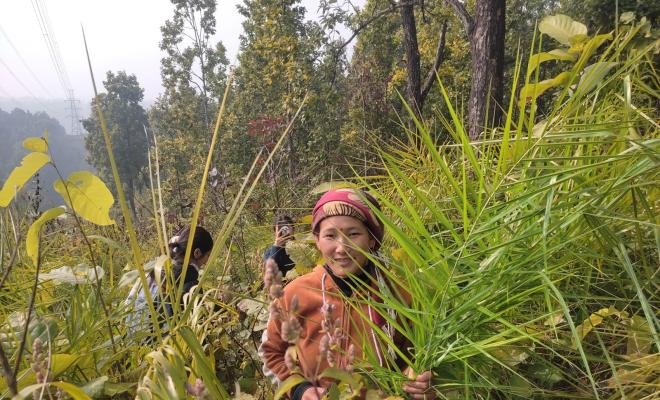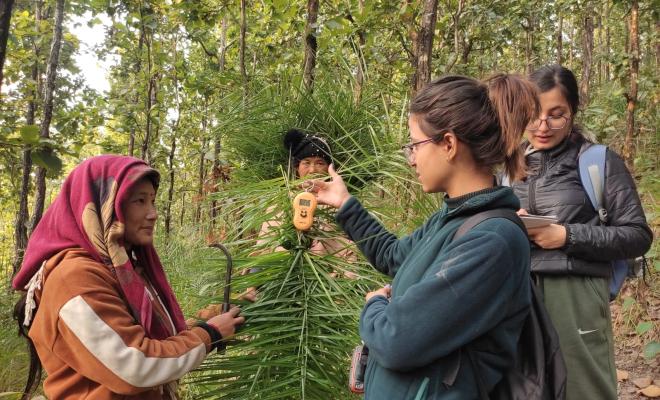Sustainability of women’s access to forest resources is ensured

The case of a gender-transformative approach from Nepal
Turning weeds into valuable products
“I could not imagine how valuable the Thakal (Phoenix loureiroi Kunth) plant could be for rural women. It is generally considered as a weed and we used to clear it to save the forest tree species. Today I was surprised to see diverse beautiful handmade products made from this ‘weed’. Looking at the Thakal products by women of the Namuna Community Forest User Group, I realised the importance of this plant for the rural economy. “
Those were the words of Mr Mohan Raj Kafle, the Divisional Forest Officer of Nawalparasi at a policy lab organised by the “Economic Empowerment of Women through Forest Solutions” project, recently.
The lab involved rural women entrepreneurs, the Local Government Chief and officials, private bank officials, a Chief from the Cottage and Small Industry Office, a Divisional Forest Officer from the district government, and project personnel.
Rural women in Nawalparasi district of central Nepal have succeeded in producing bags, hats, and mats from Thakal, bio-cups and plates from Sal (Shorea robusta) leaves, and brooms from broom grass. The lab provided the occasion for Mr Kafle and others to appreciate the initiative and encourage women entrepreneurs with commitments of support.
Not only was this a matter of courtesy, but also of legacy for the project. The words meant a lot for the rural women who have been using leaves, straws, twigs and Thakal-derived fibres to produce handicrafts and increase earnings from their sale.
Creating the legal framework for women’s economic activities
Patient work was needed to reach this level of achievement.
Generally, these women do not face any restrictions in accessing the raw materials in the forest, as long as the products are for household use. However, once the materials are converted into products for market, the women have to meet several legal requirements.
Nepal has a community forestry system whereby registered forest user groups can harvest forest products according to approved operational plans. The area where the women wish to harvest must have the provisions mentioned and the amount of harvest prescribed in the approved Community Forestry Operational Plan. These explicit permissions for raw material collection would be based on a proper inventory of each resource, to ensure sustainable management and harvest.
During visits to Division Forest Office, the project team discussed the policy issues. Mr Kafle suggested the project team should conduct an inventory of available non-timber forest products (here in our case, Thakal and Sal leaves) and incorporate their management and collection in the Operational Plan. This would not only be an operational issue, but would also create a legal platform for women entrepreneurs to sustainably assess the raw materials for their enterprises.
The project formed a technical team to conduct Thakal and Sal inventory and prescribe the regeneration status and annual allowable harvest in the Operational Plan. Since Thakal is rare in the country, the project consulted experts to devise an appropriate method for carrying out its inventory. The Community Forest User Group and women’s groups members were engaged in the inventory process, which increased their self-confidence and self-respect too. They shared their pride in being a part of such a technical study.
Following the inventory, the team revised the Operational Plan, and Mr Kafle approved these plans with respect. He also provided the women with encouraging words that these were very innovative efforts that he would like to expand to the rest of the Community Forest User Groups.

Transformation in local women’s status – a strong foundation for their futures
The project “Economic Empowerment of Women through Forest Solutions” tried to ensure that rural women have sustainable access to forest resources including non-timber forest products, which are often overlooked as useless grass and other fibres and are left out in the forest, causing fire hazards. The inclusion of these provisions facilitated the use of these materials to create products for sale in the market.
With the official approval from the Division Forest Office, the rural women feel respected for their own choices and decisions, feel much more responsible for conserving the forest and making the most useful application of their traditional knowledge to foster household economies.
In the complete process, besides the role of the project team, experts and the Community Forest User Group executive members, the role of the Divisional Forest Officer remained as a constructive technical advisor. His appreciation and facilitation of the women’s needs, choices and decision-making processes remain commendable.
The initiation will be upscale by the project through different means of dissemination including publication of the blog in Nepali language in a national newspaper and community FM radio. The project will promote the transformation through The Federation of Community Forestry Users Nepal (FECOFUN)- a formal network of Forest User Groups from all over Nepal. Furthermore, this experience and evidence will be shared widely in the national policy lab and dialogues to influence the authorities.
This action can be coined as a “gender transformative legacy in action” on how to ensure rural women’s sustainable access and control over minor forest products by raising women’s dignified decisions and choices for forest-based livelihoods.

